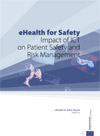 The eHealth for Safety study takes a broad look at the information and communication technology (ICT) tools that can lead to higher quality of care, increased patient safety, and better risk management in health services and healthcare in Europe. It does so through a mix of desk research and provision of empirical evidence. It brings together into this mix the views of leading researchers and practitioners from around the globe from a series of high-level discussions and workshops.
The eHealth for Safety study takes a broad look at the information and communication technology (ICT) tools that can lead to higher quality of care, increased patient safety, and better risk management in health services and healthcare in Europe. It does so through a mix of desk research and provision of empirical evidence. It brings together into this mix the views of leading researchers and practitioners from around the globe from a series of high-level discussions and workshops. As a result, this report outlines the whole field of ICT and patient safety as seen from a holistic vision. It includes appropriate definitions, gathers and analyses factual data, describes the main workshop outcomes, and then makes a defi nitive set of recommendations for future research on ICT and patient safety. Among the consistent roadmapping that is currently being undertaken in relation to European research, this report provides yet another vision of important, possible research directions.
This report was prepared by the eHealth for Safety study team (empirica GmbH and Symbion) on behalf of the European Commission, Information Society and Media Directorate General.
Download "eHealth for Safety - Impact of ICT on Patient Safety and Risk Management" Report (.pdf, 1,6MB, 70 pages).
Download from the eHealthNews.EU Portal's mirror: "eHealth for Safety - Impact of ICT on Patient Safety and Risk Management" Report (.pdf, 1,6MB, 70 pages).
For further information:
ICT for Health
European Commission - Information society and Media DG
Office: BU31 06/73 B-1049 Brussels
Email: This email address is being protected from spambots. You need JavaScript enabled to view it.
Tel: +32 2 296 41 94
Fax: +32 2 296 01 81
http://europa.eu/information_society/eHealth